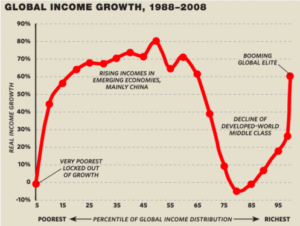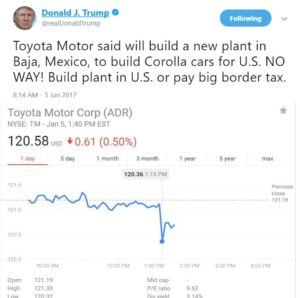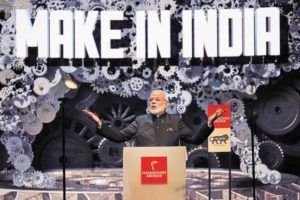Navigating Tricky Terrain: Toyota In An Isolationist World

In an increasingly inward-looking world, corporate CEOs need to reach out more than ever before.
Isolationism: A Trend in Solitary Confinement?
Oh no.

Britain chose to exit the EU, Donald Trump was elected US President & Marine Le Pen’s loss let down 44% of the French electorate. These results were a result of a large cross-section of society feeling left out of the mainstream of economic progress and capital formation. An anti-establishment sentiment was triggered, and populist political figures rose to the fore.
Globalization and its Discontents [1]
Globalisation has had a transformational effect on the world economy by creating jobs, lifting millions out of poverty and providing consumers better goods at lower prices.
But the picture is not all rosy. The biggest problem for developed countries is the loss of jobs that are transferred to low-cost economies. According to Robert Scott of the Economic Policy Institute, for the US, China’s most favored nation status drained 3.2 million jobs, and the trade deficits with Japan and Mexico cost 896,000 jobs and 682,900 jobs respectively. [2]
Political Bosses Push the Brakes

On 5th January 2017, President-elect Trump threatened Toyota with a mega-border tax if they built a new plant in Mexico to manufacture cars for the US. The tweet sent Toyota’s stock crashing, losing 5% ($1.5 bn) of value in under 24 hours. While the stock has since recovered, there’s a larger lesson in the exercise.
With governments pushing for greater investment and job creation in their own country, global corporations like Toyota face the prospect of having their businesses hit by economic tools like trade tariffs and barriers.
Additionally, once-impoverished nations like India, China and Indonesia – now economic powers – expect corporations like Toyota to build locally, teach local workers new skills and share technological know-how. [3]
Toyota has manufacturing operations in 28 countries, while its vehicles are sold in over 170 countries [4]. It is commercially and technically unviable for it to manufacture locally for every market. Setting up shop in a new location is complex, requiring facilities to build plants, cheap labor, seamless flow of raw materials and output, and favorable tax conditions.
Not Pulling The Andon Cord Yet
Toyota’s manufacturing process is well known for immediately addressing assembly line challenges, but its management is yet to push the panic button. The Japanese automaker issued a statement stating that the new Mexican plant would have no impact on US production or employment, and that the company would continue investing in the US. [5]
Recognizing the enormity of the threat, Toyota has gone out of its way to win favor with the new administration. Toyota President Akio Toyoda went on record to say that he looked forward to working with the Trump administration, following up with a meeting with VP-elect Mike Pence.
The Japanese government too has stepped in. Prime Minister Shinzo Abe’s cabinet secretary was quoted saying, “Toyota has tried to be a good corporate citizen in the US”. Mr, Abe also had a one-on-one meeting with the Mr. Toyoda prior to his official visit to the White House.
Clearly, Toyota is focused on strengthening its relationships with governments in key markets. Mr. Toyoda has been in dialogue with other heads of state, like Indian Prime Minister Modi, whom he met earlier this year to commit to the ‘Make In India’ program through a Toyota-Suzuki business partnership.

Toyota is undertaking a wise strategy. By deepening its ties with key governments, it betters its odds of minimizing the loss of short-term investments already underway. Simultaneously, Toyota can bolster future partnerships and negotiate sweet deals in return for enabling political leaders fulfill their economic agenda.
This is easier said than done. Building trusting relationships with governments requires sustained dialogue. Mr. Toyoda would need to regularly engage with them, but also empower local management to work closely with the government and take critical decisions that align stakeholder interests when possible. This will ensure that the relationship is not confined to the annual prodigal meeting. We have seen this strategy used by CEOs of large tech companies (Apple, Microsoft, Oracle) as they look to tap high-potential markets.
Elections today are won on the plank of job creation and economic growth. Political leaders need the private sector to deliver on this, and this is where the opportunity for Toyota arises. If it can find ways to boost production in high-growth economies, Toyota will be in a position to negotiate profitable exemptions and tax holidays. It would also provide a cushion against volatility in smaller markets.
Up for Debate: Quick Zip or a Long Drive?
Unlike climate change or digitalization, trade barriers are created and reversed by the stroke of a pen. This begs a couple of key strategic decisions:
- Populist leaders will find it hard to go back on their election manifestos and return to free trade. How does Toyota’s strategy change if isolationism does indeed become the new normal?
2. How can Toyota use its global influence to turn the current political atmosphere into an opportunity, negotiating manufacturing terms that are even more profitable than the status quo?
(Word count: 798, without titles and references)
References
[1] Title of book by Joseph Stiglitz. The book, however, focuses on the harm globalization does in developing countries
[2] http://www.providencejournal.com/article/20150328/OPINION/150329282
[3] https://www.wsj.com/articles/ge-the-ultimate-global-player-is-turning-local-1498748430
[4] http://newsroom.toyota.co.jp/en/corporate/companyinformation/worldwide
[5] http://pressroom.toyota.com/article_display.cfm?article_id=5882&sf49616414=1&sf49623541=1



Awesome read and thank you for the insightful questions. If isolationism does indeed become the go-to strategy going forward, perhaps firms such as Toyota will have to decentralize manufacturing and decision making to focus on certain markets. This would enable key decision makers to connect with politicians and policy makers in the U.S. and elsewhere on a regular basis without creating conflicts with the home headquarters. This would also likely make it easier for Toyota to negotiate better trade policies within its subsidiaries, although complications would arise with capital costs and reconciliations required to execute the strategy.
Companies like Toyota not only create benefits in the form of jobs, taxes, etc., but they create massive benefits because of the products they sell (Toyota sells nearly 200,000 cars each month in the U.S.). As such, Toyota has an inherent negotiating leverage because of the impact and ubiquity that its cars have in many countries. If they decided to stop offering cars, this would upset some consumers which may have a spillover affect on political races. I think it could use its brand and scale, in addition to the economic benefits mentioned, to push more favorable terms with governments.
Great read, thanks for posing for some important questions. To your first question, let’s assume that isolationism continues to play out on the global stage. One potential option I thought of is for Toyota to local their final assembly plants in certain local markets (in order to obtain favorable free trade agreements), while sourcing their parts globally. One parallel to draw is the manufacturing process between Apple iPhones and Google Androids, where the former is manufactured end-to-end within Apple’s ecosystem of factories and suppliers and the latter typically takes on a more scattered, globalized sourcing and manufacturing model. However, given what we learned in TOM about the Toyota Production System, this may be infeasible given that Toyota requires extremely tight-knit partnerships with their suppliers. Frequently, this even means co-location between Toyota and its supplier(s).
On your second question, I wonder if Toyota could band together with other global automakers and form an industry alliance on such an issue. Given that global automakers are likely facing the same isolationist trends, and offer similar benefits to local markets such as corporate tax revenue and job creation, this might be a more effective route than Toyota’s individual efforts with the US government. At the end of the day, cars are a global product and thus, global consumers would lose if countries imposed huge tariffs on any car imports.
You bring up some interesting points about the need for Toyota to navigate political waters in an every growing isolationist world. I think one of the key factors is to understand what the isolationist platform is really all about. It isn’t just about jobs and economic factors. There are other factors involved, for example Brexit had much to do about how the EU was gaining enough power that Britain was more and more feeling of a loss of Autonomy, and the influx of immigrants who are not assimilating well into the British culture. The US, has a similar problem and so much of isolationism is coming from a desire to have individual countries be responsible for their own people and have their own set of laws. This is a tricky issue for a company like Toyota to work through because “fair trade” is rooted in the same premise of “what is best for our own people.” How does a company like Toyota show countries like the US that they are working in the best interest of the US citizen while also having an expectation back home in Japan to be working for their own country’s Nationalist desires?” Would they ever lobby to Japanese government over trade policies that help the US over Japan? It seems that as these isolationist trends intensify, companies like Toyota are stuck between a rock and a hard place.
I would challenge Cissy on the comment “isolationism is coming from a desire to have individual countries be responsible for their own people”, and Ko-Lee on the notion that free trade currently exists (or is something that can be returned to). Free trade is when goods are brought between two areas without any fees, and it could be argued that it was developed for areas who play by the same rules. Because what if one area does not respect its people, or the environment, or the government helps finance its businesses, or manipulates currency? A great quote I read was “American companies…end up competing not with foreign companies but with sovereign foreign states”. Furthermore, the world has always placed tariffs on each other’s goods and provided subsidies to businesses, far from ‘free’ trade. I think this is less of a question of returning to free trade, but creating fair trade that promotes mutual benefit for all countries.
The Folly of Free Trade https://hbr.org/1986/09/the-folly-of-free-trade
Interesting piece! I find it interesting how in one hand Trump uses a big stick to bring a foreigner inside its borders and on the other uses another big stick to build a wall, and push other foreigners out. Not that many carrots in this Administration, and while some foreigners are craved, others are expelled. Given this context, I find it hard to believe that isolationism per se, closing completely in itself, will ever be the reality for the US. More than any moral value, the driver seems to be whatever brings more economic growth, job, wealth, and prosperity to America. In that sense, Toyota definitely has a carrot. Its carrot might not be big enough to face Trump’s stick on its own, but if all Japanese or even all Asian manufacturers get together the conversation might change drastically.
Thanks for the interesting article! The threat of isolationism is clearly a massive threat to manufacturers like Toyota that sell to a wide range of countries. Unfortunately, politicians who advocate isolationist policies like this fail to weigh the end impact on consumers: if Toyota has to set up a separate factory in each country, then the overall scale benefits they achieve at each factory will be lower, costs will be higher, and thus the final price that consumers pay will be higher. Alternately, Toyota can choose to just manufacture in one country and pay a tariff when they ship products across borders, but directionally this will have the same impact on costs and consumer prices. This reality makes me skeptical that isolationism is here to stay, as I doubt voters will be happy to pay more for most products over the long run.
Governments are threatening a lot of negative impacts (mostly tariffs) if companies manufacture in foreign markets, but it’s also worth remembering that governments are offering some positive incentives for countries to manufacture within their borders. Wisconsin’s subsidy to Foxconn, as described in Danny’s great article, is a great example of this. Toyota has the potential to benefit from this as well, and should seek significant government subsidies any time they open a new plant. Toyota has been wise to keep a close and friendly relationship with many governments, as this puts them in a better position to receive these subsidies.